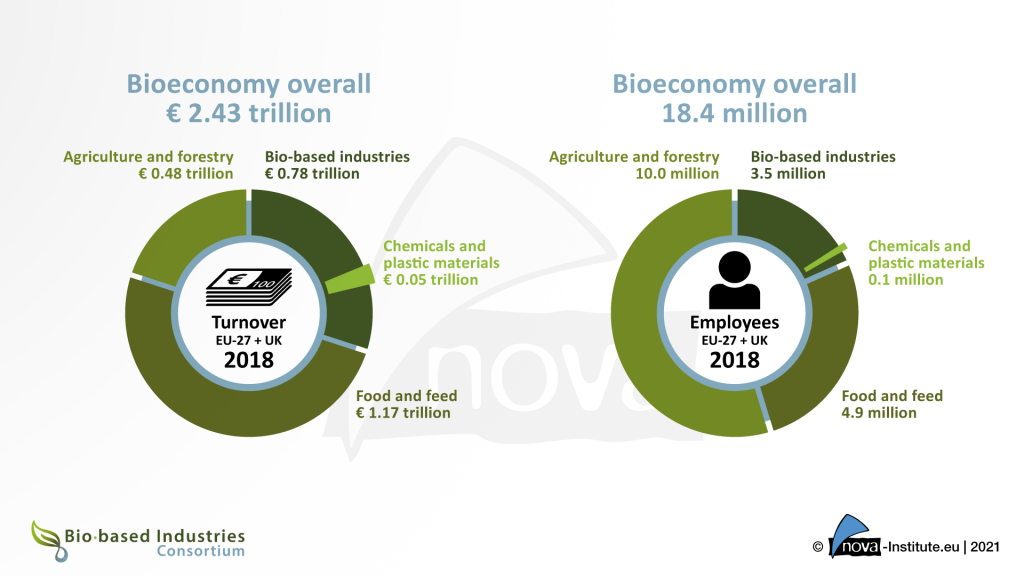The bio-based industries continue their ascent marking a total contribution of 780 billion EUR, a notable increase of 30 billion EUR (+ 4%) compared to 2017. This represents a more than 20% increase compared to 2008 which is the earliest data taken into account in this series of reports by nova-Institute. The first report of the series was first commissioned by the Bio-based Industries Consortium (BIC) in 2017. Figures for the bio-based chemical industry (including plastics) alone reveal a turnover of around 54 billion EUR with the bio-based share relatively stable at around 15%, up from 7.5% in 2008.
Visuals and PDF file in English and German available at: www.nova-institute.eu/press/?id=293
The analysis of the 2018 Eurostat data shows that the turnover of the total bioeconomy*, including food and beverages and the primary sectors of agriculture and forestry, amounts to just over 2.4 trillion EUR in the EU-27 and the United Kingdom, an increase of around 25% since 2008. The food and beverage sector accounts for about half of the turnover, the bio-based industries, such as chemicals and plastics, pharmaceuticals, paper and paper products, forest-based industries, textiles, biofuels and bioenergy account for roughly 30%, while almost another 20% are generated by the primary sectors of agriculture and forestry.
In contrast to the rising turnover figures, employment in the European bioeconomy has declined slightly from 18.5 million people in 2017 to a total of 18.4 million people in 2018, largely due to efficiency increases in production. The primary biomass production, mainly agriculture, provides a majority of the entire employment (54%) but a comparatively low turnover (20%).

The data also demonstrates clear differences between groups of Member States. For example, the Central and Eastern European countries of Poland, Romania and Bulgaria are more represented in the lower value-added sectors of the bio-based economy, which create many jobs. This indicates a strong agricultural sector that tends to be labour-intensive compared to the high value-added sectors. In comparison, Western and Northern European countries generate much higher turnover relative to employment, indicating a larger share of refining and value-added industries. The countries with the highest turnover-to-employment ratios are Finland, Belgium and Sweden.
The full report is free of charge and available here: www.renewable-carbon.eu/publications/product/european-bioeconomy-in-figures-2008-2018-pdf/
Note to editor:
The nova-Institute’s market report is commissioned by the Bio-based Industries Consortium (BIC) and was first published in 2016, demonstrating for the first time the macroeconomic effects generated by the bioeconomy, e.g., turnover and employment for the years 2008 and 2013. Since then, the report has been updated on an annual basis. The latest version covers the period from 2008 to 2018.
*The primary sectors (agriculture, forestry, and fisheries) and the food, beverage, tobacco and paper and paper products can be considered fully bio-based and are thus fully accounted for in the bioeconomy. For other manufacturing sectors such as chemicals, pharmaceuticals and textiles, the bio- based shares were estimated and included in the report’s assessment.
About BIC
The Bio-based Industries Consortium (BIC) is the private partner in the 3.7 EUR billion public-private partnership with the EU – the Bio-based Industries Joint Undertaking (BBI JU). Its membership includes 240+ industry members covering the whole value chain, from primary production to the market, across multiple and diverse sectors, such as agriculture & agri-food, aquaculture & marine, chemicals and materials, including bioplastics, forestry and pulp & paper, market sectors, technology providers and waste management & treatment. BIC’s membership also includes over 200 associate members such as research organisations, academia, trade associations, etc. To learn more about BIC, you can consult our brochure here. Find all of BIC’s press releases and news at www.biconsortium.eu/news.
For BIC press enquiries, please contact:
Ben Kennard, (Communications & Stakeholders Relations)
Email: ben.kennard@biconsortium.eu
Phone: +32 (0) 487 39 21 82
About nova-Institute
nova-Institute is a private and independent research institute, founded in 1994; nova offers research and consultancy with a focus on the transition of the chemical and material industry to renewable carbon: How to substitute fossil carbon with biomass, direct CO2 utilisation and recycling. We offer our unique understanding to support the transition of your business into a climate neutral future. nova-Institute has more than 40 employees.
For nova-Institute press enquiries, please contact:
Email: contact@nova-institut.de
Phone: +49 (0) 22 33-48 14 40
Internet: www.nova-institute.eu – all services and studies at www.renewable-carbon.eu
Source
Supplier
Bio-based Industries Consortium (BIC)
nova-Institut GmbH
Share
Renewable Carbon News – Daily Newsletter
Subscribe to our daily email newsletter – the world's leading newsletter on renewable materials and chemicals









